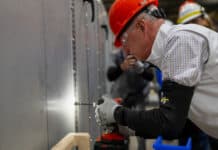Some aspects of decreased efficiency from age can be remedied or mitigated without resorting to expensive component replacement or refurbishment. The lubricating oil found in HVAC compressors impacts performance efficiency on two fronts. First, acting as a lubricant the oil reduces frictional forces on the mechanical moving parts. As the oil degrades from wear and excessive heat the friction protection diminishes causing increased energy use to operate.
The second function of the refrigerant oil is to act as a viscous seal within the compressor to minimize compressed refrigerant blow by that will migrate into the compressor oil sump. Some of the refrigerant oil escapes the compressor circulating through the heat exchanger coils. The circulating oil mostly returns to the compressor, but over time a residual oil film adheres to the heat exchanger coil walls, an issue referred to as oil fouling. The oil film acts as a thermal insulating barrier between the flowing refrigerant and the coil walls, decreasing the efficiency of the system.
How To Reclaim Lost Efficiency To Aged Equipment
In addition to a strong PM program, a less utilized option is to reclaim lost performance using additives. Oil additives have been around for decades and have greatly improved with material science advances. Extreme pressure oils utilize small amounts of phosphorus or sulfur and other elements that minimally coat a surface but increase the wear resistance by an order of magnitude.
Additionally, there are validated additives that restore lost efficiency by displacing migrated refrigerant oil that adheres to the inside surfaces of heat exchanger coils. Specific performance tested additives can even help achieve a 10% to 15% HVAC energy efficiency gain and extend equipment life by lessening the mechanical wear deferring component and system replacement, such as ThermaClear. This is another tool for PM programs that can bolster efficiency in aging HVAC equipment.
Performance gains can be made with the advances in equipment, system monitoring, and material science, but the most valuable insight comes from shared experiences between facilities professionals continuously learning and improving. Stay curious, open minded and listen and share experiences with your fellow facilities professionals. N
 Daly, P.E., Chief Technology Officer at ECM Technologies, is a seasoned professional with 30-plus years of engineering and business management experience. He has made a career of developing, manufacturing, and selling lifesaving and life-changing technologies focused on energy conservation measures. Currently, he is bringing HVAC innovation to the market with ThermaClear, ECM Technologies’ proprietary nano-fluid formulated to optimize refrigerant performance and help building owners improve the energy efficiency and sustainability of their real estate footprint.
Daly, P.E., Chief Technology Officer at ECM Technologies, is a seasoned professional with 30-plus years of engineering and business management experience. He has made a career of developing, manufacturing, and selling lifesaving and life-changing technologies focused on energy conservation measures. Currently, he is bringing HVAC innovation to the market with ThermaClear, ECM Technologies’ proprietary nano-fluid formulated to optimize refrigerant performance and help building owners improve the energy efficiency and sustainability of their real estate footprint.
Do you have a comment? Share your thoughts in the Comments section below or send an e-mail to the Editor at jen@groupc.com.


















![[VIDEO] Collect Asset Data at the Speed of Walking a Building](https://facilityexecutive.com/wp-content/uploads/2024/02/maxresdefault-324x160.jpg)